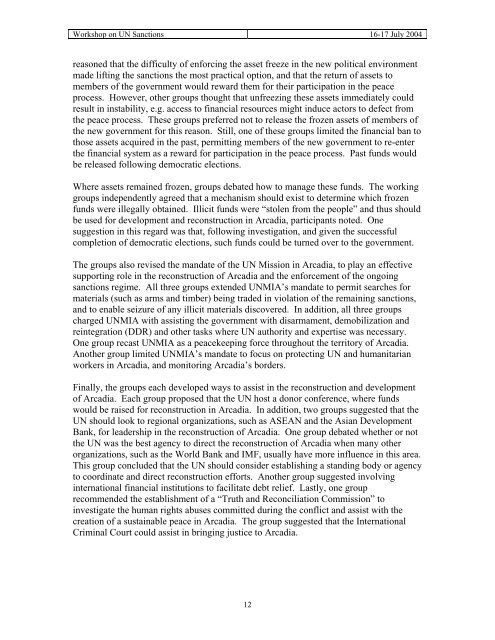UN Sanctions Reform - The Watson Institute for International Studies
UN Sanctions Reform - The Watson Institute for International Studies
UN Sanctions Reform - The Watson Institute for International Studies
You also want an ePaper? Increase the reach of your titles
YUMPU automatically turns print PDFs into web optimized ePapers that Google loves.
Workshop on <strong>UN</strong> <strong>Sanctions</strong> 16-17 July 2004<br />
reasoned that the difficulty of en<strong>for</strong>cing the asset freeze in the new political environment<br />
made lifting the sanctions the most practical option, and that the return of assets to<br />
members of the government would reward them <strong>for</strong> their participation in the peace<br />
process. However, other groups thought that unfreezing these assets immediately could<br />
result in instability, e.g. access to financial resources might induce actors to defect from<br />
the peace process. <strong>The</strong>se groups preferred not to release the frozen assets of members of<br />
the new government <strong>for</strong> this reason. Still, one of these groups limited the financial ban to<br />
those assets acquired in the past, permitting members of the new government to re-enter<br />
the financial system as a reward <strong>for</strong> participation in the peace process. Past funds would<br />
be released following democratic elections.<br />
Where assets remained frozen, groups debated how to manage these funds. <strong>The</strong> working<br />
groups independently agreed that a mechanism should exist to determine which frozen<br />
funds were illegally obtained. Illicit funds were “stolen from the people” and thus should<br />
be used <strong>for</strong> development and reconstruction in Arcadia, participants noted. One<br />
suggestion in this regard was that, following investigation, and given the successful<br />
completion of democratic elections, such funds could be turned over to the government.<br />
<strong>The</strong> groups also revised the mandate of the <strong>UN</strong> Mission in Arcadia, to play an effective<br />
supporting role in the reconstruction of Arcadia and the en<strong>for</strong>cement of the ongoing<br />
sanctions regime. All three groups extended <strong>UN</strong>MIA’s mandate to permit searches <strong>for</strong><br />
materials (such as arms and timber) being traded in violation of the remaining sanctions,<br />
and to enable seizure of any illicit materials discovered. In addition, all three groups<br />
charged <strong>UN</strong>MIA with assisting the government with disarmament, demobilization and<br />
reintegration (DDR) and other tasks where <strong>UN</strong> authority and expertise was necessary.<br />
One group recast <strong>UN</strong>MIA as a peacekeeping <strong>for</strong>ce throughout the territory of Arcadia.<br />
Another group limited <strong>UN</strong>MIA’s mandate to focus on protecting <strong>UN</strong> and humanitarian<br />
workers in Arcadia, and monitoring Arcadia’s borders.<br />
Finally, the groups each developed ways to assist in the reconstruction and development<br />
of Arcadia. Each group proposed that the <strong>UN</strong> host a donor conference, where funds<br />
would be raised <strong>for</strong> reconstruction in Arcadia. In addition, two groups suggested that the<br />
<strong>UN</strong> should look to regional organizations, such as ASEAN and the Asian Development<br />
Bank, <strong>for</strong> leadership in the reconstruction of Arcadia. One group debated whether or not<br />
the <strong>UN</strong> was the best agency to direct the reconstruction of Arcadia when many other<br />
organizations, such as the World Bank and IMF, usually have more influence in this area.<br />
This group concluded that the <strong>UN</strong> should consider establishing a standing body or agency<br />
to coordinate and direct reconstruction ef<strong>for</strong>ts. Another group suggested involving<br />
international financial institutions to facilitate debt relief. Lastly, one group<br />
recommended the establishment of a “Truth and Reconciliation Commission” to<br />
investigate the human rights abuses committed during the conflict and assist with the<br />
creation of a sustainable peace in Arcadia. <strong>The</strong> group suggested that the <strong>International</strong><br />
Criminal Court could assist in bringing justice to Arcadia.<br />
12
















